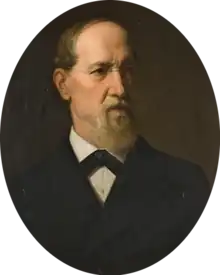Matija Ban | |
|---|---|
 | |
| Native name | Матија Бан |
| Born | 16 December 1818 Dubrovnik, Austrian Empire (now Dubrovnik, Croatia) |
| Died | 14 March 1903 (aged 84) Belgrade, Kingdom of Serbia (now Belgrade, Serbia) |
| Occupation | writer, diplomat |
| Notable works | Cvijeti Srbske (1865); Vanja (1868) |
Matija Ban (Serbian Cyrillic: Матија Бан; 6 December 1818 – 14 March 1903) was a Serbo-Croatian poet, dramatist, and playwright. He is known as one of the earliest proponents of the Serb-Catholic movement in Dubrovnik.
Ban was born in Petrovo Selo near Dubrovnik, then in the Kingdom of Dalmatia in the Austrian Empire, now in Croatia.[1] Matija Ban settled in Serbia in 1844. He is commonly regarded as being the first to use the term "Yugoslav", in a poem in 1835.[2] In 1848 he came from Serbia to Dalmatia to study the state of national sentiment there. He is known for his Romanticist popular tragedies.
See also
References
- ↑ Ban, Matija (in Croatian). Hrvatska enciklopedija. Accessed March 2022.
- ↑ Anzulovic, Branimir (2000). Heavenly Serbia: From Myth to Genocide. Australia: Pluto Press Australia. p. 195. ISBN 1-86403-100-X.
Further reading
- Jovan Skerlić, Istorija Nove Srpske Književnosti/ A History of Modern Serbian Literature (Belgrade, 1921), pages 199-201.
- Stjepan Ćosić. "Posljednji odjek - Katja Bakija: Knjiga o "Dubrovniku" 1849–1852". Kolo (in Croatian). Matica hrvatska. Archived from the original on 29 December 2008.
- Njegos.org Short Biography (in Serbian)
This article is issued from Wikipedia. The text is licensed under Creative Commons - Attribution - Sharealike. Additional terms may apply for the media files.